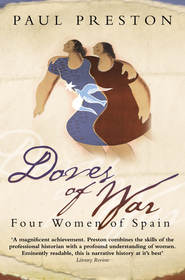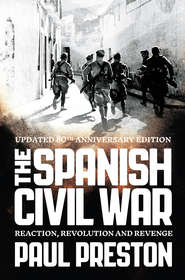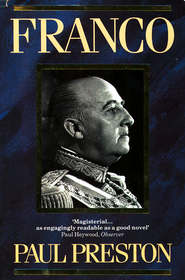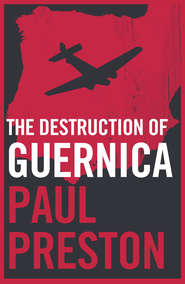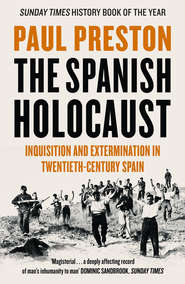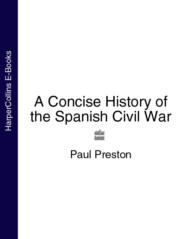По всем вопросам обращайтесь на: info@litportal.ru
(©) 2003-2024.
✖
Juan Carlos: Steering Spain from Dictatorship to Democracy
Настройки чтения
Размер шрифта
Высота строк
Поля
(#litres_trial_promo) This was exacerbated when the Conde de los Andes reported on the harshness of Franco’s tone during their negotiations on the agenda to be discussed in the forthcoming meeting between the Caudillo and Don Juan. Outlining his own plan for the Prince’s education, he had told the astonished count that: ‘If Don Juan does not accept such an education for his son, or his son does not agree to it, the Prince should not return to Spain and that will mean that he has renounced the throne and that I will consider myself free of any understanding with him.’ Pacón noted in his diary that a meeting was utterly pointless because he knew that nothing would make Franco deviate from the plan that he had laid out. He bluntly told Pacón, ‘If Don Juan wants his son ever to reign in Spain, he must submit to my wishes, which are for his own good and for that of the fatherland, by entrusting the boy’s education to me. It must be without interference from anyone and handed over only to people that I trust totally.’
(#litres_trial_promo)
Don Juan set off for Spain by car on 28 December 1954. Franco left El Pardo at 8 a.m. on the next morning in a Cadillac and with a convoy of guards. Both were headed for a halfway point between Madrid and Lisbon – Navalmoral de la Mata in the province of Cáceres in Extremadura. Arriving in Spain that evening was an emotional moment for Don Juan, the first time that he had set foot in his homeland since his failed attempt to join the Nationalist forces in 1936. The meeting – at Las Cabezas, the estate of the Conde de Ruiseñada, Juan Claudio Güell, the Pretender’s new representative in Spain – lasted from 11.20 a.m. to 7.30 p.m. with a late lunch break. At the steps of the mansion, the ever-affable Don Juan greeted Franco cordially and had created a relaxed atmosphere by the time that they sat before a roaring fire. He felt confident, telling Franco that he had received thousands of messages of support from Spain including telegrams from four Lieutenant-Generals. However, such references to the current debate on the monarchist succession went over Franco’s head as relating to a far distant and theoretical future. This became clear when he began to talk of the possibility of separating the functions of Head of State and Head of Government. He would do so only, he said, when his health gave out, or he ‘disappeared’ or because the good of the regime, with the evolution of time, required it, ‘but, as long as I have good health, I don’t see any advantages in change’.
Franco was clearly at his ease, talking without pause or even a sip of water, and he proceeded to give Don Juan an interminable, rambling history lesson. Don Juan commented later that it was like listening to an obsessive grandfather boasting about his past. In fact, Franco’s reminiscences about his own military exploits could be seen as a sly attempt to humiliate Don Juan, who had not been allowed to fight in the Civil War. Efforts by Don Juan to get a word in edgeways and turn the discussion to the timing of the transition to the monarchy and the terms of the post-Franco future met with a frosty response. Franco did not hesitate to criticize many prominent monarchists as drunks and gamblers, accusing Pedro Sainz Rodríguez, about whom he had the most neurotic delusions, of being a freemason. When Don Juan praised Sainz Rodríguez as a faithful counsellor, in whom he had complete confidence, Franco replied, ‘I have never trusted anyone.’
Don Juan’s suggestion of the introduction of freedom of the press, an independent judiciary, social justice, trade union freedom and proper political representation merely reinforced Franco’s conviction that he was the puppet of dangerous aristocratic meddlers who were probably freemasons. Through the impenetrable and self-satisfied verbiage glimmered the Caudillo’s message. As he had already informed the Conde de los Andes: if Don Juan did not bow to his demand that Juan Carlos be educated under his tutelage, he would consider it as a renunciation of the throne. The needs, let alone the wishes, of Juan Carlos simply did not enter into the debate. Faced with Franco’s ultimatum, Don Juan thus agreed that his son be educated at the three military academies, at the university and at Franco’s side. However, he made it quite clear that none of this constituted a renunciation of his own rights. With the greatest reluctance, Franco accepted an anodyne joint communiqué whose terms implicitly, if not explicitly, recognized the hereditary rights to the throne of the Borbón dynasty. It was a minor victory for Don Juan that his name should appear alongside that of Franco.
(#litres_trial_promo)
The joint communiqué aside, Franco had made no real concessions about a future restoration, or rather installation, as he called it. Nevertheless, the theatrical gesture of meeting Don Juan had, for the moment, drawn the sting of the monarchists and gave the impression that progress was being made. In his end of year message on 31 December 1954, he made it quite clear that he had conceded nothing to Don Juan. Using the royal ‘we’, he stressed that the monarchist forms enshrined in the Ley de Sucesión had nothing to do with the monarchy of Alfonso XIII. In the wake of the Las Cabezas meeting, the Caudillo was publicly affirming that he did not renounce his right, enshrined in the Ley de Sucesión, to choose a successor to guarantee the continuity of his authoritarian regime.
(#litres_trial_promo)
Chatting with Pacón on the same day, Franco claimed that, at Las Cabezas, Don Juan had asked him if he thought it was necessary to abdicate in order that his son should have the right to inherit the throne. The exchange is not recorded in other accounts of the meeting. Indeed, those accounts suggest that what Don Juan actually said was that allowing his son to be educated in Spain did not constitute an abdication of his own rights. However, if it was not just wishful thinking on Franco’s part and Don Juan did ask the question, it could be interpreted as a ploy to force Franco to acknowledge the dynastic rights of the family. If, at Franco’s behest, Don Juan had abdicated in favour of his son, the Caudillo would have been committing himself to choosing Juan Carlos as his successor. It is unlikely that the question of abdication was raised in the precise terms recounted by Franco to his cousin. However the subject was raised, Franco’s reply, at least in his own account to Pacón, was a masterpiece of cunning.
Unwilling to reduce his options, the Caudillo allegedly replied, ‘I do not think that the problem of your abdication needs to be raised today, as we are here to discuss your son’s education, but since you’ve mentioned it, I must tell you that I believe that Your Highness rendered himself incompatible with today’s Spain, because against my advice that Your Highness remain silent and make no declarations, you published a manifesto in which you refused to collaborate with the regime and thus made yourself incompatible with it.’ He went on to talk of his ‘inclination’ to name as his successor a direct heir to Alfonso XIII. However, he also mentioned the strong temptation to nominate a prince from the Traditionalist branch of the family as a reward to the Carlists for their role in the Civil War and their loyalty thereafter. If the conversation took place as he claimed, it revealed his determination both to humiliate Don Juan and to keep open his own options.
(#litres_trial_promo)
At the point at which Juan Carlos was about to return to Spain to be educated as a possible successor to Franco, his own interests as a human being were being sacrificed for a gamble. Franco could choose between a Carlist, Don Juan, Juan Carlos, Don Jaime or his son Alfonso and, perhaps, even the newborn Francisco Franco Martínez-Bordiu. Neither Juan Carlos nor his father can have been unaware of this. It must have been difficult for Juan Carlos not to feel like a shuttlecock in someone else’s game.
Before setting out for Las Cabezas, Don Juan had written to the Caudillo’s wartime artillery chief, General Carlos Martínez Campos y Serrano (the Duque de la Torre), asking him to be the head of the Prince’s household in Spain and thus charging him with the supervision of his son’s military education. Stiff and austere, the 68-year-old Martínez Campos was known for his dour seriousness, his acute intelligence and his sharp tongue. His marriage had broken down, and by his own admission, he had failed in the education of his own children. Even Franco was moved to comment: ‘God help the boy with that fellow!’
(#litres_trial_promo) Nevertheless, it was a choice that provoked considerable satisfaction at El Pardo. Until recently, Martínez Campos had, after all, been Military Governor of the Canary Islands. The general reported to Franco on 27 December. Pacón noted in his diary: ‘The Duque de la Torre is totally trustworthy and utterly loyal to the Caudillo.’ In fact, this was not entirely true – Martínez Campos was loyal and obedient, but he had considerable reservations about Franco personally and about the way in which he treated Don Juan. Juan Carlos later commented that the Duke ‘didn’t get on’ with Franco. Now, in the course of their conversation, Martínez Campos mentioned Don Juan’s annoyance at the way in which Franco, in laying out his plans for the Prince’s education, had ridden roughshod over his own rights as a father to educate his son. The Caudillo was unmoved, reiterating blithely his view that it was one thing to educate a son, another to train a Prince to reign. He added that, if Don Juan didn’t like it, he could do whatever he liked but would lose the chance of ever seeing his son on the throne.
(#litres_trial_promo) Once more, it was being made crystal clear that the personal interests of the 15-year-old adolescent mattered little in the wider political game being played out.
When General Juan Vigón, Chief of the General Staff and a fervent monarchist, heard of the choice of Martínez Campos and the arrangements for Juan Carlos, he was shocked, exclaiming, ‘It’s the wrong way to go about this! It’s playing politics rather than educating the boy!’
(#litres_trial_promo) Martínez Campos himself was hardly less critical of his own appointment. He remarked to a family friend, ‘This is women’s work.’
(#litres_trial_promo) It is fair to say, therefore, that the selection of this rigid and irritable soldier was based not on any consideration of Juan Carlos’s needs but on the fact that he had enjoyed good relations with Franco. It was typical of Martínez Campos’s style that, once in charge, he would prevent Juan Carlos receiving visits from his beloved old tutor, Eugenio Vegas Latapié. In his eyes, the deeply conservative Vegas Latapié was a subversive.
(#litres_trial_promo) The consequence of the meeting at Las Cabezas, as far as Juan Carlos was concerned, was that, in early 1955, he would be obliged to leave Estoril once more and start preparing for the entrance examinations for the Zaragoza military academy.
The preparations for this began on 5 January 1955, when Martínez Campos telephoned Major Alfonso Armada Comyn, an intelligent aristocratic artillery officer, son of the Marqués de Santa Cruz de Rivadulla, to arrange a clandestine meeting. As they drove through Madrid, Martínez Campos passed him the letter from Don Juan. ‘Congratulations, General,’ said Armada as he handed it back. With a mixture of contempt and indignation, the general spat out: ‘Are you just pretending to be stupid or are you really thick? Do you think it is possible that I would waste time just so you could congratulate me for something that I don’t like, didn’t ask for and is worrying the hell out of me? Can’t you understand that they’ve dropped me in it?’ A chastened Armada replied in a whisper, ‘Then refuse.’ ‘No,’ replied the general, ‘that wouldn’t be right. It’s an honour, an uncomfortable one, full of responsibilities, especially being dumped on me now that I’m old and I was never any good at bringing up my own children. But let’s not waste time. I don’t have to give you explanations. You’re young and have many children. Both you and your wife know palace life and its secrets.’
Martínez Campos’s choice of Armada was understandable and one that would have profound effects throughout Juan Carlos’s life. The young Major Armada’s credentials, both as a monarchist and as a Francoist, were impeccable. Armada’s father had been a childhood friend of Alfonso XIII, as had his father-in-law, the Marqués de Someruelos. As artillery generals, both were friends of Martínez Campos. At the age of 17, Armada had himself fought as a volunteer on the Nationalist side in the Civil War. In July 1941, shortly after graduating from the artillery academy in Segovia, he had joined the División Azul in order to fight alongside the Germans on the Russian front, for which he was awarded the Iron Cross. After completing his studies at the general staff college, he joined the general staff of the Civil Guard. Now, despite efforts to dissuade the general, Armada was overruled and told to report for duty the next day.
(#litres_trial_promo)
Martínez Campos instructed Major Armada to prepare lists of officers from the various Army corps who might be recruited as teachers for the young Prince. He was also charged with organizing the staff of the Prince’s residence, choosing suitable companions and arranging Juan Carlos’s studies and even leisure-time reading. Martínez Campos cast aside some of Armada’s suggestions and chose others. A daunting team of officers would supervise the boy’s studies. The Prince’s infantry professor was to be Major Joaquín Valenzuela, the Marqués de Valenzuela de Tahuarda, whose father had been killed in Morocco when he was Franco’s immediate predecessor as head of the Spanish Foreign Legion. The teacher in charge of Juan Carlos’s horse-riding, hunting and sporting development was to be the 50-year-old cavalry major Nicolás Cotoner, Conde de Tendilla, and later to be Marqués de Mondéjar. Brother-in-law to the Conde de Ruiseñada, Cotoner was a grande de España who had fought in the Civil War. He was a firm admirer of Franco which meant that he was viewed with some suspicion in Estoril.
(#litres_trial_promo) The chaplain was Father José Manuel Aguilar, a Dominican priest who happened also to be the brother-in-law of Franco’s Minister of Education, the Christian Democrat Joaquín Ruiz Giménez. The history teacher was Ángel López Amo, who had taught Juan Carlos at Las Jarillas. Mathematics was in the hands of a strict naval officer, Lieutenant-Commander Álvaro Fontanals Barón.
(#litres_trial_promo)
A hint from Martínez Campos had led to the Duque and Duquesa de Montellano graciously putting at the Prince’s disposal their palace in Madrid’s Paseo de la Castellana, where in the 1949–1950 academic year his classmates from Las Jarillas had vainly awaited his return from Estoril. The cost of running the Prince’s establishment was to be met by Carrero Blanco’s Presidencia del Gobierno (the cabinet office). Juan Carlos travelled from Lisbon to Madrid in the company of Martínez Campos on 18 January 1955. This time, there was rather more pomp at his arrival than on his first trip to Spain in November 1948. The Prince travelled by train, in the well-appointed coach in which Franco had made the journey to meet Hitler at Hendaye in October 1940. It is to be supposed that repairs had been effected to the leaks that had blighted Franco’s trip. Juan Carlos was no longer obliged to get off the train on the outskirts of the city. Now, he was met at the Delicias station by the Mayor of the capital, the Conde de Mayalde, by the Captain-General of the region, General Miguel Rodrigo Martínez, and a crowd of several hundred monarchists, most of them aristocrats. His arrival – and unfounded rumours that, at Las Cabezas, Franco had agreed to the return of Alfonso XIII’s mortal remains to Spain – intensified tensions among hardline Falangists. The council of the organization of party veterans, the Vieja Guardia (Old Guard), which attributed to itself responsibility for maintaining the ideological ‘purity’ of the regime, sent a delegation to protest to the Secretary-General of the Movimiento, Raimundo Fernández Cuesta.
(#litres_trial_promo)
Falangist anger was largely due to the fact that the communiqué issued after the Las Cabezas meeting had immediately sparked off monarchist-inspired rumours that the Caudillo was now actively preparing an early transition to the monarchy. Franco responded quickly to the first mutterings of protest about such a prospect. Within a week of Juan Carlos’s arrival, he gave a widely reproduced interview that dispelled any hopes of his early departure. ‘Although my magistracy is for life,’ he declared pompously, ‘it is to be hoped that there are many years before me, and the immediate interest of the issue is diluted in time.’ Franco was yet again making it clear, to his supporters and to Don Juan, that the monarchy would be a Falangist one in no way resembling that which had fallen in 1931.
(#litres_trial_promo) In the face of potential opposition to what seemed to be the appeasement of Don Juan, Franco was asking the docile Falangist hierarchy to postpone the ‘pending revolution’ even longer in return for a Francoist future under a Francoist king.
(#litres_trial_promo) Accordingly, in February 1955, he authorized the drafting of laws to block loopholes in the Ley de Sucesión and irrevocably shackle any royal successor to the Movimiento. At the same time, to make this more acceptable to his monarchist supporters, the Falangist edges of the Movimiento would be blurred, censorship of the monarchists would be relaxed, and Eugenio Vegas Latapié was reinstated to the Consejo del Reino.
(#litres_trial_promo)
Within hours of the Prince’s arrival in Madrid, a queue of well-wishers, among them some aristocrats, had gathered outside the Palacio de Montellano. Like Franco, Martínez Campos was determined to ensure that there would be no entourage of courtiers at the palace. The Civil Guards on duty permitted those who came merely to sign the visitors’ book and then leave.
The year and a half spent in the Palacio de Montellano preparing for the entry examination for the Zaragoza military academy would be a hard trial for Juan Carlos. This time, he had no friends to accompany him. In his austerely furnished room, the only personal items were some family photographs, a tiny triptych of Christ and a luminous statue of Our Lady of Fatima. Martínez Campos established an inflexible routine that left the boy little spare time. The Prince was woken at 7.45 a.m. and had three-quarters of an hour in which to wash, hear mass in the chapel, have breakfast and glance at the newspapers. The hour from 8.30 a.m. to 9.30 a.m. was devoted to private study. At 9.30 a.m., accompanied by his maths tutor, Álvaro Fontanals Barón, the Prince would set off for his classes at the naval orphans’ college in Madrid where he followed a rigid timetable until 1.15 p.m. After lunch at the palace, there would be golf or horse-riding in the Casa de Campo until 5.00 p.m. Back at the palace, there would be more study until 9.00 p.m. at which time Juan Carlos was allowed an hour for letter-writing or telephone calls.
He had little free time since classes were held even on Saturdays and Father Aguilar often visited to impart religious and moral education. Other time was consumed by visits from distinguished academics who gave prepared talks on their specialities. The only glimmer of jollity in the otherwise stultifying atmosphere derived from the fact that a young friend, Miguel Primo de Rivera y Urquijo, the nephew of José Antonio Primo de Rivera, lived nearby and thus became the Prince’s frequent companion. It was to develop into a lifelong friendship. At the time, it helped relieve the tedium of the regular lunch and dinner visits from important figures in the Church, the Falange, and the business world – including the head of the Opus Dei, Padre Josémaría Escrivá de Balaguer. This austere routine was rarely stimulating – indeed, if anything, it was utterly suffocating – for an adolescent. Asked by the diplomat José Antonio Giménez-Arnau how he felt about his loneliness and the absence from his family, Juan Carlos replied sadly, ‘If not resigned, I’m at least used to it. Just imagine! When I was six, I spent two years separated from my parents when they were first in Estoril. There was no choice.’ Giménez-Arnau had been commissioned to write a feature article on the Prince. When it was published, Juan Carlos wrote him an informal note of thanks. The unaffected warmth and openness of the 17-year-old Prince’s note guaranteed the lifelong loyalty of its recipient.
(#litres_trial_promo)
Occasionally, the Prince was taken to El Pardo where the Caudillo subjected him to interminable history lessons about the mistakes made by various kings of Spain. He also gave him sententious advice about the need to avoid aristocrats and courtiers. Believing that the Prince was extremely pleased and grateful, Franco decided to see him at least once a month, ‘to chat with him and carry on instilling my ideas in him’. The Caudillo was delighted by the severity of Martínez Campos who reported to him on 5 March 1955. When the Prince had begun to tutear (use the intimate ‘tú’ form of address to) Major Valenzuela, the general had energetically forbidden it. He had refused the Prince permission to go to Lisbon for the wedding of one of the daughters of the ex-King Umberto of Italy, informing Don Juan that it would constitute an unacceptable interruption of the boy’s studies. He insisted on speaking English with Juan Carlos. He also made every effort to ensure that no particular one of the Prince’s friendships came to take priority over the others. That Martínez Campos felt it necessary to report to Franco gives some indication of the ambience in which the Prince was being educated. He was permitted, on occasions, to invite friends to lunch. Once, he was visited by the beautiful Princess María Gabriella di Savoia, King Umberto’s other daughter, a friend and fellow-exile from Portugal, who later became his girlfriend. The Prince was usually short of cash, later recalling how Major Cotoner had to buy him a suit for the occasion.
(#litres_trial_promo)
The tendency to high spirits that had characterized Juan Carlos as a schoolboy did not desert him despite his austere surroundings. One of the teaching staff, the Air Force Major Emilio García Conde, had a Mercedes that the Prince loved to drive, even though he did not possess a driving licence. One day, on a trip to the headquarters of the Sección Femenina (the women’s section of the Falange) at the Castillo de la Mota in the province of Valladolid, he had a minor accident involving a cyclist. Major García Conde resolved the problem by giving the cyclist some banknotes to get his wheel fixed and buy a new pair of trousers. After nearly being eaten alive by the enthusiastic women of the Sección Femenina, Juan Carlos and his party retired to lunch in a restaurant. The Prince delightedly recounted the bicycle incident and was astonished when Martínez Campos furiously ordered García Conde to find the cyclist, get the money back and oblige the unfortunate young man to report the incident to the Civil Guard. He was worried that if the young man was seriously injured, it would look as if the Prince was involved in corruptly trying to cover up his own involvement. He insisted that Juan Carlos return to Madrid in his car.
(#litres_trial_promo)
General Martínez Campos’s loyalty and deference to the Caudillo prevented him from complaining about the fact that Franco, partly to please the Falange and partly to bring the monarchists to heel, had encouraged criticism of Don Juan in the press. In consequence, as the general knew full well, hostility to the monarchy soon began to be directed against Juan Carlos. At the beginning of February 1955, the Mayor of Madrid wrote to Franco’s cousin, Pacón. In response to the scattering of Falangist leaflets bearing the inscription ‘We want no king!’, the Mayor asked how it was possible, if Franco wanted Juan Carlos educated in Spain, that the regime’s single party should be engaged in insulting the Prince. When Pacón mentioned this to the Caudillo, he brushed it aside as ‘student antics’. However, the rumblings came from much higher in the Falange, including Pilar Primo de Rivera, the head of the Sección Femenina. Nevertheless, Franco brushed aside further reports about anti-monarchist activities from such dignitaries as the Captain-General of Valencia. The mutter-ings continued and, eventually, on 26 February, the Caudillo felt obliged to inform a concerned cabinet that ‘a King would be nominated only if there were a Prince ready for the task’.
(#litres_trial_promo)
Juan Carlos’s presence in Spain and its possible implications were highlighted by the publication in ABC on 15 April 1955 of his interview with José Antonio Giménez-Arnau – the first press interview published since his arrival in Spain in 1948. A few days later, violence broke out between Falangists and monarchists at the end of a lecture on European monarchies given by Roberto Cantalupo, once Mussolini’s Ambassador to Franco, at the Madrid Ateneo, the capital’s leading liberal intellectual centre. In response to Cantalupo’s enthusiastic advocacy of monarchy, Rafael Sánchez Mazas, a former minister of Franco, cried ‘¡Viva la Falange!’ in reply to which shouts of ‘¡Viva el Rey!’ or ‘¡Viva Don ]uan III!’ were heard from monarchists present. Falangists then showered the hall with leaflets ridiculing Juan Carlos and the police had to be called to put a stop to the fight that erupted. The Prince also faced the increasingly overt hostility of the then Minister for the Army, General Agustín Muñoz Grandes, whose sympathies lay with the Falange. Later on that spring, young Falangists roamed the streets of Madrid shouting: ‘We don’t want idiot kings!’ Juan Carlos was also booed while he was giving out the prizes at some horse trials, and, in the summer, he was insulted during a visit to a Falangist summer camp.
(#litres_trial_promo)
The noises coming from Falangists were the dying agony of a wounded beast. In reality, their organization could not have been more domesticated. On 19 June 1955, the Secretary-General of the Movimiento, Raimundo Fernández Cuesta, declared in a speech made in Bilbao that to ensure the survival of the regime after Franco’s death, judicial, political and institutional guarantees would be necessary. The role of the Movimiento would be to sustain the monarchy that succeeded Franco and to keep it on the straight and narrow path of Francoism. It was the formal recognition by the Falange of the inevitability of a monarchical succession.
(#litres_trial_promo) For their part, the monarchists had to accept that the monarchy would be restored only within the Movimiento. To hammer this home, Franco exploited the anxiety of the sycophantic Julio Danvila, the most Francoist of Don Juan’s advisers, to further the establishment of a Francoist monarchy. At Franco’s behest, the willing Danvila concocted the text of an ‘interview’ with Don Juan in which he apparently gave royal approval to Fernández Cuesta’s speech. Franco agreed the text, which Danvila then took to Estoril where an indignant Don Juan refused to agree to its publication. Danvila then told the Caudillo that the Pretender had accepted the ‘interview’, at which point Franco amended the text to bring it even more into line with his own thinking and obliged ABC and Ya to publish it on 24 June 1955. Although outraged, Don Juan did not protest, since a public break between himself and Franco would have encouraged the anti-monarchical machinations of the extremist elements of the Falange. It might also have led to the termination of Juan Carlos’s education in Spain.
(#litres_trial_promo)
Franco was unconcerned about the Falangist rejection of his apparent choice of conservative monarchism as the future of the regime. At the November 1955 rally in El Escorial to commemorate the anniversary of the death of the Falange’s founder, José Antonio Primo de Rivera, Franco rekindled Falangist anxieties about his Las Cabezas meeting with Don Juan and the presence of Juan Carlos in Spain. He had arrived for the ceremony in the uniform of a Captain-General instead of the usual black uniform and blue shirt of the Jefe Nacional (National Chief of the Movimiento). There was some nervous shuffling in the ranks of the assembled Falangists. As Franco walked across the square towards his car, a voice called out: ‘We want no idiot kings.’ It has also been alleged that a cry of ‘Franco traitor’ was heard. There were other minor incidents reflecting Falangist discontent with the complacency of the regime that Franco dismissed as of little consequence.
(#litres_trial_promo)
The constant running down of the Borbón monarchy, together with Franco’s assumption of royal airs, deeply annoyed Don Juan and his family. This was reflected in the indiscreet comments of Alfonso de Borbón, the second son of Don Juan. When he was 14 years old, Alfonsito was wont to refer to Franco as ‘the dwarf or ‘the toad’. He said, ‘That fellow won’t leave. He has to be kicked out … Having to visit him makes me vomit and la Señora, always showing her teeth, kills my appetite.’ It was an indication both of Don Juan’s deteriorating relations with Franco and the fact that Alfonsito was such a favourite that his outbursts were tolerated and praised. Not many years before, Don Juan had smacked his daughter Margarita for repeating a joke about Franco. Things had changed and there can be little doubt that critical remarks about Franco or his wife would quickly have been relayed to El Pardo by the many monarchist visitors who maintained a dual ‘loyalty’.
(#litres_trial_promo)






